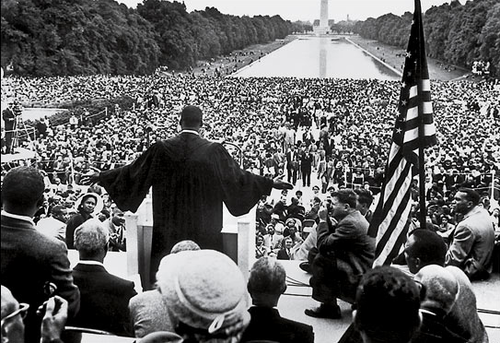I Have a Dream
As a young boy growing up in Pennsylvania, life seemed simple. Living not to far from Gettysburg I remember climbing and playing hide and seek with my brother and sister at Devil’s Den, one of the most significant positions held during the battle of Gettysburg in The American Civil War. It all seemed surreal at the time. As simple as our playtime was the history also seemed simple as well. My dad, being a lover of history shared with us the struggle between the northern and southern states. During those small history lessons he spoke of the struggle between an industrialized northern economy and a agricultural southern economy, tariffs and most of all slavery. It was evident as my father spoke that all three were important but slavery was the most significant issue of all. In particular, the enslavement of the African American people group within the southern states.
It all seemed pretty clear, for a ten year old that is. Through the Civil War, Abraham Lincoln, the signing of the Emancipation Proclamation which abolished slavery and the uniting of the southern and northern states, racism was over. Right! For a white suburban middle class boy growing up in a Central Pennsylvania home, I simply didn’t understand. The affects of this oppression had never made it to my doorstep.
18 years later, after moving to South Carolina in the summer of 2001 I began to realize that life and history for many wasn’t so simple. Within days of arriving in South Carolina I realized that prejudism, racism, class wars and the residual affects of slavery were alive and well. The extent of it was shocking. During those years of great learning many of my new friends exposed me to the teachings and leadership of Martin Luther King Jr.. All I can say, “I was inspired”. This past week while reading The handbook of Leadership Theory and Practice by Nitin Nohria and Rakesh Khurana I was struck by the concept of “prophetic imagination” used within social movement leadership. Prophetic imagination happens when a leader can combine experiencing the world’s pain with experiencing the world’s possibilities while at the same time not be “numbed by despair or deluded by optimism”. It was evident while reading this section that one of the greatest modern examples of this form of leadership style was the late Dr. Martin Luther King Jr..

“Prophetic Imagination”
He educated… In the United States during the 1960’s, nearly a hundred years after the American Civil War racism was still alive and well. Throughout many towns and communities many still believed that there needed to be segregation between African Americans and whites. At the core of this issue was the belief that one race or people group is superior to another. Dr. Martin Luther King Jr. began to educate, bringing those with differences together and in the end helping each to realize that they are no different from one another.
He inspired… During this time the African American people group were simply oppressed. Our social structure during this time was content with separate schools, public bathrooms, water fountains and even churches. Dr. Martin Luther King Jr. inspired a people group and those who stood with them, that life could be better. Oppression did not have to be a way of life, but rather their stars could be changed. Eventually schools, bathrooms, water fountains and restaurants became integrated.
He informed… Many throughout the United States, much like my upbringing, simple did not come in contact with the oppression and abuse in which many African Americans were facing on a daily basis particularly in the South. When leaders fail to inform, many who would stand side by side with them through social change simply are unaware. Through his speeches and marches, Dr. Martin Luther King was able to inform and entire nation.
In his August 28, 1963 speech, “I Have a Dream” which was delivered from the steps of the Lincoln Memorial, Dr. Martin Luther King Jr. called for racial equality and the end to discrimination before a crowd of 200,000 people. Watch and capture his “Prophetic Imagination”.
As a young boy growing up in Pennsylvania I knew very little! Gettysburg was simply a place to play. Now, as a middle age man, I have the responsibility to stand up for any who are oppressed, regardless of the cost.
How about you? Where has racism affected you?
Have you offered hope in the midst of oppression?
Have you provided a dream?
Leave a Reply
You must be logged in to post a comment.